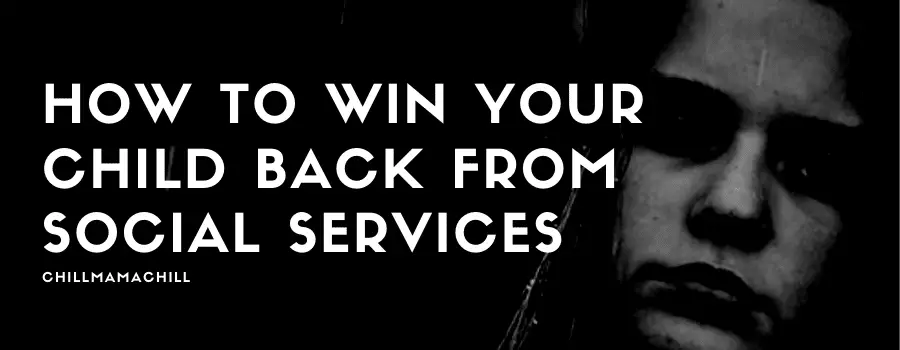Losing your children to social services can be one of the most traumatic experiences you encounter. When you love your child, it is natural to go through an emotional roller coaster during this period.
It is difficult to believe the court would order your children to live with strangers when you are a good parent. It is even harder to comprehend that social services can take away your child because you don’t have the money they demand or the paperwork necessary for them to leave you at home.
Unfortunately, there is very little you can do at this point to avoid the social services roadblock. It is a foregone conclusion that your children will be living with strangers, and you will be allowed visits after work and on weekends if you are lucky.
But there is something you can do to win back your children when the initial involvement of social services comes to an end.
Why Can You Lose Custody Of Your Child?
There are several reasons for you to lose custody of your child.
- The most common reason for social services to take your child away is a simple lack of money. You don’t have the means to support your family, so you are forced to apply for state assistance to keep a roof over your head and food on the table.
- You might also find yourself coming under scrutiny because of drug or alcohol abuse. For one reason or another, you are unable to break free from these addictions. It could be your unwillingness to get help for the problem that forces social services into action.

Other reasons why you might end up losing custody of your child include:
- Unexplained injuries on your children
- A general lack of care for your children
- Neglect of responsibilities
- Abuse to your children
These are perfectly valid reasons for removing a child from an unfit home. However, there is no need to give up the fight once you have been chosen as being unsuitable for the responsibility of caring for your children.
What To Expect If Social Services Take Your Child
When your child is taken into the custody of social services, an emergency protection order is filed against you. You have very little time to prepare for this drastic change in circumstances. Even if you are the one that reports an injury or other wrongdoing on your child, you could find yourself under investigation by social services.
The first thing you can expect is an end to the relationship with your child. Unless you are considered a danger to your other children, they will be allowed visits once or twice a week. It might be only on Sunday nights and no more than two hours in length.
The next thing you can expect is to find out where your child has been taken and receive a phone call to set up a visit with your child. You may find that the living environment is clean and caring, with good food and attentive staff.
In many cases, you will be allowed visits once per week for one hour. These visits must be supervised by the social worker in charge of your case.
9 Steps You Should Take To Win Your Child Back From Social Services
After the custody has been turned over to social services, you have few rights as a parent during this period. Unless you have been proven legally unfit, it won’t be easy to win your parental rights back.
You will be given a visitation schedule that must be adhered to under the penalty of incarceration.
1. Find An Attorney You Can Trust
It’s a good idea to have an attorney who understands the family court system and is well respected in the judges’ chambers. Although there are always exceptions, most family court judges do not care about the rights of parents when social services take over their children. They see it as a necessary step for protecting children from neglectful parents.
However, they are more likely to listen to your attorney because they can provide well-researched information that shows the negative impact of social services involvement. For this reason, it is best to hire an attorney who has practiced family law for at least ten years and has a good reputation in the community.
2. Enquire About The Nature Of Your Allegations
You must find out the exact nature of your allegations. Social services agencies are very secretive about these matters and will keep family members in the dark as much as possible until they have a court order to remove children from their homes.
You have the right to know why your child has been taken into custody by social services. You also have a right to see the Children’s Services file and learn what your agency is basing its decision on.

Ask the CPS social worker to obtain a court order permitting you to get your child’s file and read the allegations against you.
3. Request That Your Child Be Under The Care Of A Relative
Sometimes, social services will refuse to place children with family members for various reasons. But it is certainly worth a try if you have living relatives willing to care for your child. After the request, you will be required to attend a Team Decision-making Meeting with the family member. The social worker will listen to the relative’s offer and either accept it or refuse it.
Suppose you have a relative willing to care for your child, file a court order that directs social services to place your child with that person while they are involved in the case. Your family member must be financially secure and provide a good home for your children.
4. Request An Evaluation
If you and your attorney feel social services did not follow proper procedures, you can request an evaluation. It means another agency will investigate the allegations of neglect and findings of fact and ask for input from both sides. In that case, the judge would then rule on whether or not you should regain custody of your children based on this other party’s report.
Although there is a charge for the evaluation, you will likely get back any money you pay. You can also request an assessment by a court-appointed evaluator instead of one chosen by social services.
5. Follow The Court Order
Do everything that the court tells you to do, even if it makes no sense to you. Strict compliance with their orders is the best way to prove that social services did not follow proper procedures. Judges are less likely to believe that parents can adequately care for their children when parents refuse to cooperate with the court order.
Make sure you follow all provisions regarding visits with your children, even if there are restrictions on how much time you spend with them. Also, be prompt in sending in reports and working toward reunification plans. If social services have done their job, the only choice is to follow the court order.
6. Work Toward Reunification
To ensure that you get your children back, you need to work toward reunification. As such, you cooperate with social services and follow their recommendations for becoming a better parent. It would help if you also did everything that the judge asked of you during this time. Doing so will demonstrate your commitment to being a responsible parent.
7. Attend All Visitation Sessions
If you have had supervised visits with your children, do not miss any of them. Doing so shows the social worker and the agency that you are trying to improve your parenting skills and regain custody of your children.

Make sure you have a good reason for being late or unable to attend an appointment. If possible, call ahead with an explanation so that they can expect you and it does not come as a surprise.
8. Finish Your Services On Time
If social services assign you to specific classes or programs, make sure you finish them on time. Doing so will show the agency that you are making an effort toward being given custody of your children back. Social services can ask the judge to terminate your parental rights if you fail to complete a parenting class.
9. Don’t Give Up
Parents can fight back against social services up to the appellate level. If you are sure that social services misbehaved, it is worth it to fight for your children’s return, even if you have already lost your case at the trial court.
It can take a year or more for your appeal to be processed by the state Appellate Court, but this is still much shorter than waiting for a trial at the trial court level.
Conclusion
Tragic and heartbreaking as losing your children is, it does not mean that you should give up on regaining custody. There are many ways to fight back against social services, depending on their reasons for taking away control in the first place. It may take a lot of hard work, but fighting for your parental rights is one way to prove how committed you are toward being a good parent.

I’m Cathrine and I’m a 39-year-old mother of 3 from Utica, New York. And I’m extremely happy you’ve come to visit my hide-out on the web. Here I post about everything related to family-life and usually it will involve babies and lessons I’ve learned over the years from experts, friends, and my own mistakes. So hopefully you will find what i write fun and informational!


